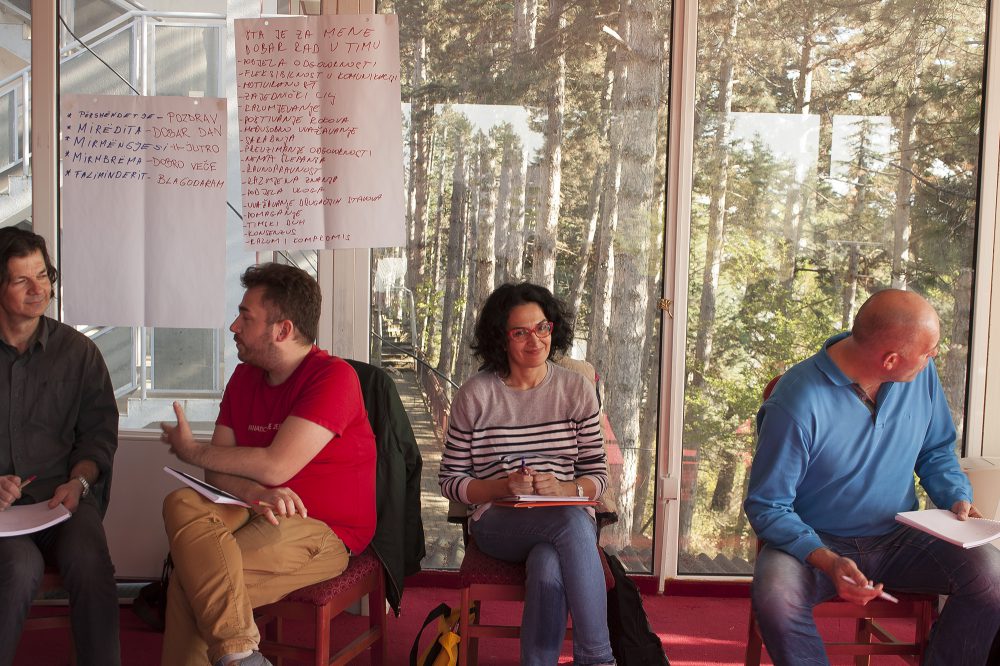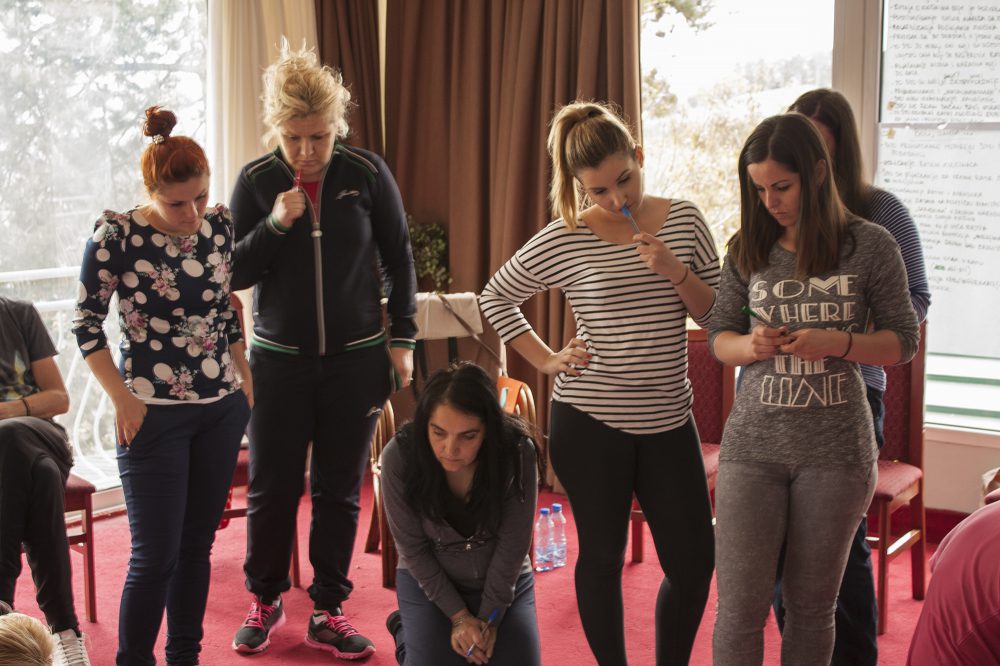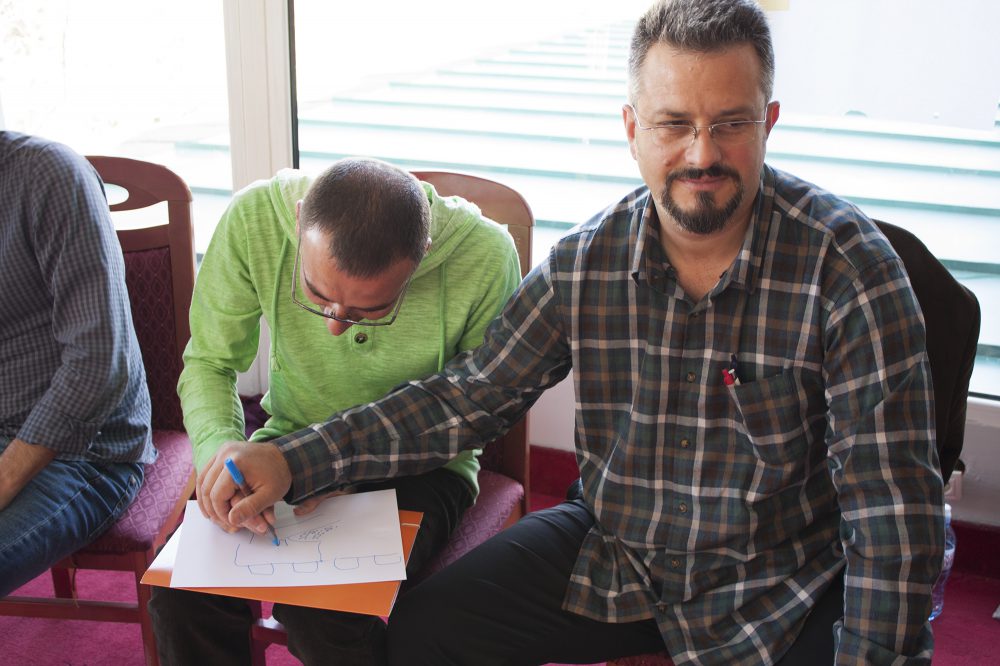The 41st basic training in peacebuilding organised by the Centre for Nonviolent Action Sarajevo/Belgrade was held in Ohrid, Macedonia from 20 to 30 April 2017. Macedonia, along with Montenegro, has recently become the most frequent location for our basic peacebuilding training because we would like to encourage more people from Kosovo and Macedonia to join us.
We received a total of 142 applications, with most coming from Bosnia and Herzegovina (72), followed by Serbia (30), Macedonia (21), Kosovo (10), Croatia (7) and two applications from Montenegro. Again, like in the previous years, the number of women applying was much higher (97) compared to the number of men (45), which influenced the selection of participants, because apart from regional and age diversity, we also aim for equal gender representation. Unfortunately, we ultimately did not have any participants from Montenegro, but the increased number of applications from Herzegovina was a welcome development because we had considerably fewer applications from this region in the past. A total of 20 people were selected to participate in the training: 7 from Bosnia and Herzegovina, 5 from Serbia, 3 from Croatia, 3 from Macedonia and two participants from Kosovo.
The training team comprising Davorka Turk, Katarina Milićević and Nedžad Novalić (Centre for Nonviolent Action Sarajevo/Belgrade) was joined by Boro Kitanoski from Peace Action Prilep, someone we consider a “permanent associate member” when trainings are organised in Macedonia and someone who is a particularly valuable collaborator thanks to his long activist experience and knowledge of the Macedonian context.
The basic training in peacebuilding underwent various transformations since its inception in 1997, with each new training requiring certain adaptations and the participants and their needs conditioning many changes. Conducting peacebuilding training almost 20 years after the end of the wars in the countries of the former Yugoslavia certainly makes us consider which direction to take. These days, we are already receiving applications from people born after the end of the wars in their countries, and in the case of Bosnia and Herzegovina, this year was the first time we had applicants born after the signing of the Dayton Peace Agreement. It was, therefore, important for us to use this basic training to bring to light the actual consequences of the wars, which is something the new generations take for granted, as something completely normal, such as, for instance, the fact that they went to school exclusively with members of their own ethnic community.
We recognised the “normalisation” of nationalism in the region, and the fact that we know less and less about important issues in other countries in the region that are not our immediate neighbours (the example of Croatia and Macedonia that works both ways) as significant trends, and one of the questions we posed at the beginning of the training concerned how to make people aware that they had the power to create change and what activism and nonviolent action meant in our time of social networks.
Before going to Ohrid, the participants had already established excellent communication, arranging to travel together, so that many of them had already met and spent the day together before arriving. Apart from meeting ahead of the training, the fact that some of the group had already attended various educational activities influenced their work in the first few sessions devoted to getting to know each other and working as a team, where some of the participants already had experience of such exercises and were now repeating them without truly engaging with this new group of people. Going for “accurate”, pre-learned and politically correct responses to avoid conflict and avoiding the personal by invoking the social (and especially the political) field, partially prevented some of the participants from experiencing parts of the training on a deeply personal level.
However, as the training continued, the group demonstrated motivation and readiness to “plough” deeper into topics such as identities/national identities, prejudice, power, dealing with the past, etc. The openness of the group, knowledge about their respective social context and their dissatisfaction with it contributed to some workshops going beyond the usual “depth”, especially the exercises on “My motivation to prevent war” and “What hurts me/what bothers me in stories about the war”.
The violent incident in the Macedonian Parliament on 27 April 2017, when a group of protesters burst into the parliament building and brutally beat up opposition MPs, significantly marked the training and caused its modification. The participants found out about the violence at the end of the sixth day of training, while we were watching the documentary “The Dotted Line” about the Macedonian-Albanian dialogue concerning the war in Macedonia in 2001, and we termed what followed after the initial information about the incident a “demonstration exercise in peacebuilding”. The already sensitised group followed the unfolding events in Skopje together, communicated with their own families, while trying to provide support to the people from Macedonia. We learned about the context and background of the violence, especially the inevitable transfer of current political tensions in Macedonia to the ethnic sphere with references to the 2001 war. Since the region, though fragmented into different states, still functions as a system of communicating vessels, the violence in the Macedonian Parliament, as well as the decision of the French authorities to release Ramush Haradinaj, the former leader of the Kosovo Liberation Army (UČK) suspected by Serbia of war crimes, echoed through the different countries, and especially through Macedonia, Kosovo and Serbia.
Being responsive to the needs of the group, we changed the morning session of the training on 28 April to deal with current events. Instead of the previously prepared workshops, we discussed the Macedonian context and the current situation, tried to formulate solutions together about what to do in such situations, what sort of support is needed… With the exercises on “Which elements could cause wars in the future” and “My motivation to prevent war”, we tried to connect the discussion about the events in Macedonia and issues of dealing with the past and peacebuilding, thereby further reinforcing the importance of the training not only in terms of the past, but also for current events in our societies. The violent incident in the Macedonian Parliament is another prime example of how our societies still consider violence a legitimate and permissible means for achieving (political) ends, and how wars from the past and the past itself are used to fuel and drive such situations.
Because of this turn of events and the need of the group to engage with this immediate conflict situation, we had comparably less time for the previously planned sessions on reconciliation and nonviolent action. Still, we see the deep explorations of dealing with the past and connecting the entire training with current events as an added value of the 37th peacebuilding training.
The different ages of the participants, where we had two war veterans in the group, contributed to lessening the generational divide between those who lived through the war(s) and those with no direct memory of the war(s) or who were born after they ended. This divide, encouraged by messages about how “the war should be forgotten for the sake of the future” seems ever wider, so that the reluctance of older generations to speak about their own wartime experiences probably comes from the desire to ensure a better future for their children. However, this results in public space being relinquished to “professional narrators” repeating established (national) narratives that do not contribute to dealing with the past and peacebuilding.
A number of participants expressed their desire and hope that the basic training would lead to various actions in dealing with the past, peacebuilding and reconciliation. We would like to encourage the group to take such steps and promise to provide active support along a path that is no easy, but is not impossible either, especially after we’ve “listed” all the steps towards reconciliation that we can make independently, without waiting for the powers that be, various ministries, governments, states, etc.
“Everyone is waiting for someone else to be the first, to make the first step, apologise, ask for forgiveness, but they don’t realise that there is no first, second or third,” said one of the participants in the training. So, let us take that step together.


